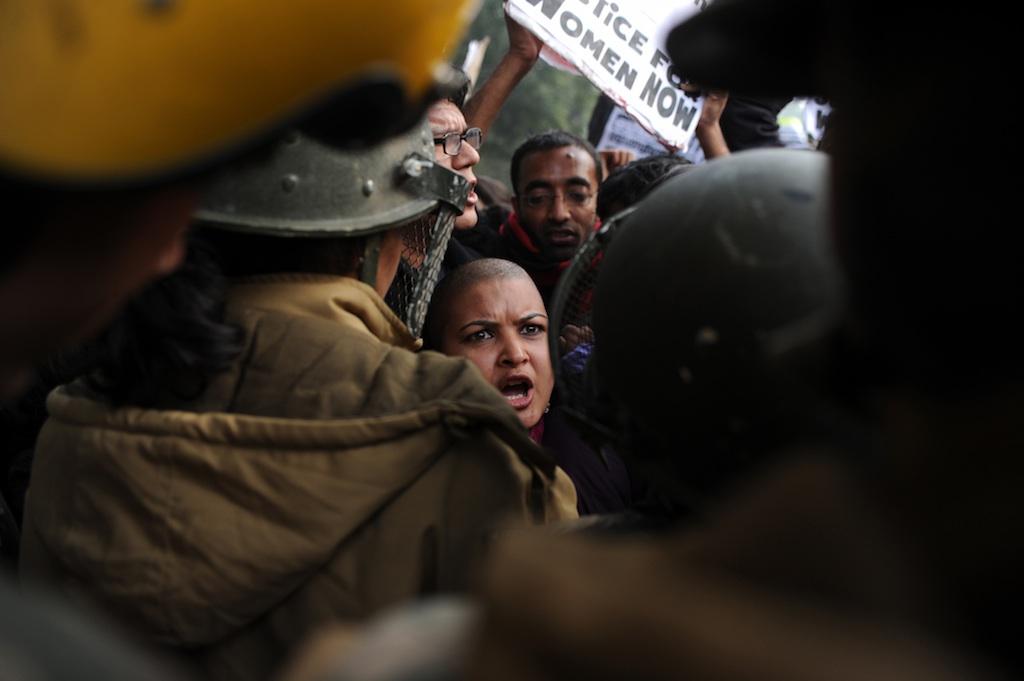How Indian courts are dealing with the Delhi gang rape case: Q & A
Indian demonstrators shout slogans and wave placards as they move towards India Gate in New Delhi on December 27, 2012, during a protest calling for better safety for women following the rape of a student in the Indian capital.
NEW DELHI, India — The lawyer representing three of the five men accused of raping and attempting to murder the 23-year-old victim in Delhi last month said they would plead not guilty.
Manohar Lal Sharma told the BBC on Tuesday that three of his clients, Mukesh Singh, Akshay Thakur and Ram Singh, would plead not guilty to the charges leveled against them.
GlobalPost spoke with two Indian lawyers to learn more about the suspects and how India's legal system deals with such cases. One of them is Rajinder Singh, a senior advocate in the Delhi High Court:
Q: Why would the suspects plead not guilty?
A: The proposition would be that the person who has pled not guilty will be sent for trial. Charges would be framed against him on the basis of the merits of the prosecution's story and thereafter the trial would begin.
Q: So does that mean it would prolong the trial and thus delay their potential execution?
A: If somebody pleads not guilty, then the entire trial process has to finish, which means all the evidence of the case has to be put before the court, then the defense counsel gets to do the cross examination, then the defense gets to call witnesses and the prosecution gets to cross examine them. So it's a long, drawn out process.
Q: What would be the advantage of pleading guilty? Would they receive a reduced sentence?
A: In normal circumstances, [that advantage would be] if somebody wants to become an approver (witness) in a case… say 10 people are brought to trial, and five say they want to turn approver and help the prosecution. But because this case has been highlighted by the media, and the entire country is against this case, [the suspects] may know that nobody is going to listen to them here.
Q: Can these suspects get a fair trial, given the atmosphere?
A: This is a media trial. All the proceedings, even if it's in camera (private) proceedings, [it's a given that] somebody will report what happened in the court to the media. The courts are going to be very strict because of the media trial. Obviously, there will be anguish in the country also.
There shouldn't be any media trials. Sometimes what happens is that even people who are not guilty, because of the effect of the media, get convicted. In this case, because of the incident, it may seem right. But the media should not have such a big impact on things.
Even the judges who are going to be responsible for these trials are motivated by the media and what is going on in the country.
Pinky Anand, a senior Supreme Court advocate, also shared her analysis with GlobalPost:
Q: What is the significance of three of the gang rape suspects deciding to plead not guilty?
A: I'm shocked as a person, but as a lawyer it's something which there is no reason why they shouldn't do it. Our system believes if you plead not guilty the prosecution is required to prove their case.
Q: Why would they plead not guilty and why might some suspects plead guilty?
A: The only upside to pleading guilty is that you might possibly get a more lenient sentence. But this case is somewhat different. Today, the society, or any system, is not looking at any leniency.
Q: Does a plea of not guilty mean that they have a better chance to capitalize on the notorious delays in the Indian court system?
A: The way things are today, I think the stage is set for a day-to-day trial. I don't think there will be any substantial delay as might happen in other cases. I think we're looking at [the proceedings completing] in a month or two, because for the time being there's immense pressure on the system to work efficiently. But it will be more protracted than otherwise.
Q: The police filed a 1,000-page charge sheet and the prosecutors refused to let two of the accused turn approver. What does that suggest about the strength of the case against the five men accused?
A: The case would be a strong one, because in India the presumption of the law is on believing the victim or in this case the victim's friend. The assumption and presumption of the law in rape cases is that the victim's testimony should be believed even without any corroboration. I was a bit dismayed by the 1,000 page charge sheet. I believe they came up with about 80 witnesses.
There's a principle of facts speaking for themselves. Here is a woman who has been raped. There's a post mortem report that says she was raped. And obviously she is dead. What else do you need?
Q: What about if one of the suspects can prove he didn't participate fully, or was less brutal than the others?
A: In law, conspiracy or common intention is as good. The punishment would be the same as for the so-called main offender. So each of them would be equally liable under the law.
Our coverage reaches millions each week, but only a small fraction of listeners contribute to sustain our program. We still need 224 more people to donate $100 or $10/monthly to unlock our $67,000 match. Will you help us get there today?
